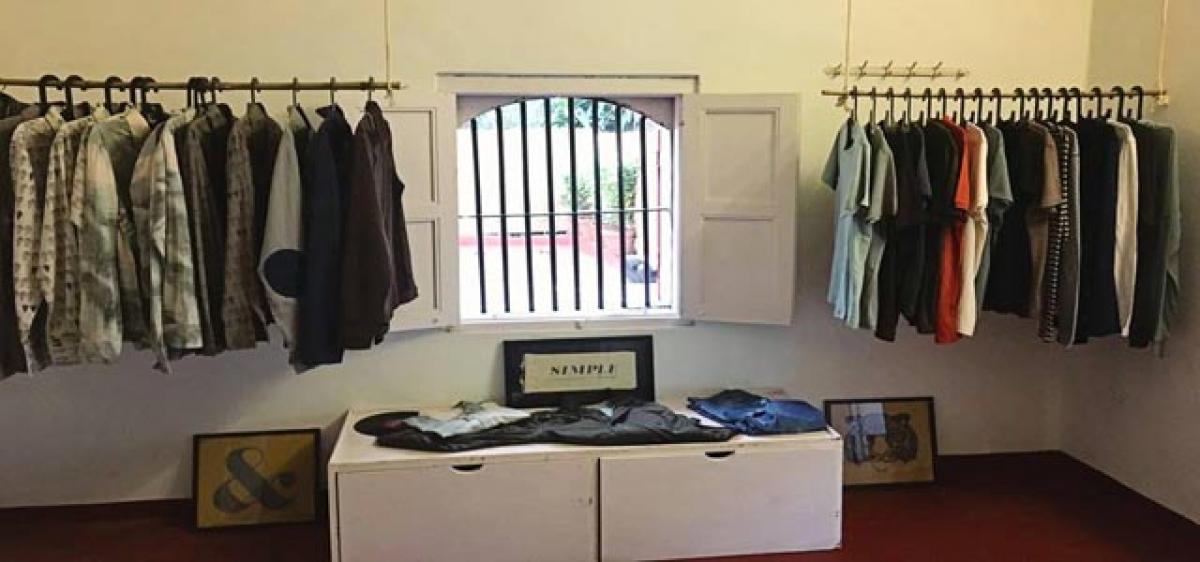Live
- UpStudy: The Smart Solution for Homework Hassles
- Actress Rithika and models inaugurate Sutraa Lifestyle Exhibition
- Loud campaign
- Faculty students celebrated english literature day in Government Degree College
- Huge fire accident.. Shops of street vendors burnt in the fire
- Pawan Kalyan promises to protect the coastal area from sea erosion
- EC Transfers Two Senior IPS Officers in AP ahead of Elections
- DMK analysis predicts victory for INDIA bloc in TN but concedes gains for BJP and NDA too
- India showcasing innovative technologies at World Energy Congress
- IPL 2024: Mitchell comes in for Ravindra as Lucknow opt to bowl first against Chennai
Just In

You know the saying, “Give a man a fish and you feed him for a day; teach a man to fish and you feed him for a lifetime,” says Apurva. “We take it a step further, we find people who will buy the fish.
You know the saying, “Give a man a fish and you feed him for a day; teach a man to fish and you feed him for a lifetime,” says Apurva. “We take it a step further, we find people who will buy the fish.”The means to facilitate this transaction is No Nasties, a home grown label that seeks to emancipate the country’s cotton farmers through ethical fashion.
Before sustainable became the new black, No Nasties was one of the first prominent labels to introduce Indian consumers to organic, fair-trade clothing. Now a 6-year-old label, No Nasties is helmed by Apurva, a techie-turned-entrepreneur, and designer Shweta Deliwala who is also his wife.
“We used to live in New York when I first read about suicides among cotton farmers,” says Apurva. Stunned at the staggering figures, Apurva and Shweta began to research further, meeting farmers and visiting factories.
The couple’s desire to contribute to the welfare of farmers gradually led to No Nasties, as Apurva left behind a lucrative career in technology to pursue the venture full-time.
“When we initially started, there was nobody doing anything of this sort. As we met people, we realised the need to start a consumer movement for ethical fashion, which supports the farming community. Farmers know sustainable methods, but there wasn’t enough demand or awareness among consumers. We wanted India to support the farmers,” says Apurva.
With a fair-trade certification from UK, No Nasties began as an organic T-shirt brand, gradually expanding to more apparel segments over the years. In promoting organic, fair-trade clothing, the label aims to direct fashion towards the emancipation of the farming community.
The No Nasties team works with two organisations a factory in Kolkata and Chetna Organic, an organic farmers’ cooperative based in Hyderabad. Following fair-trade practices, the farmers receive a premium for their products. “The profits are poured into community development projects in one village, the farmers used the money to get computers and hired professionals to teach computer skills to their children,” says Apurva.
Being organic, the cotton used is free of genetic modification and pesticides. The simplified supply chain is also deliberate the small scale of operations also contributes in keeping the label’s carbon print at a minimum. No Nasties currently offers a mix of casual clothes for men and women. The label is also expanding to include kids wear as well as accessories like organic denim bags.
The brand philosophy is simple: minimalist (no nasty) clothing to make a difference in society. According to Apurva, the challenge isn’t to make people aware of sustainability, but rather why it is necessary and how it impacts them. “What’s needed is not guilt,” he says. “We want to encourage people to make a positive difference and join a movement for change.”
As the brand grows, it is now expanding its scope with a new community development initiative Once Upon a Doug. Doug is derived from the Marathi word dhug, which means clouds, an integral part of the lives of farmers (and bears an uncanny resemblance to cotton blossoms). Currently running a pilot project in Wardha, Maharashtra, the initiative promotes cloud-shaped accessories named Doug handmade by women farmers using recycled fabrics.
“Symbols are powerful,” says Apurva ,citing the yellow Livestrong bands as example. “Clouds are a symbol for the community, and we use to provide women farmers with a secondary source of income. The sales proceeds are paid back to the community for various initiatives, from agricultural research to fencing the farms.”
Any brand or organisation can take up the Doug project, and Apurva aims to take the movement worldwide. Having felt the lack of resources and information when they started, the No Nasties team also supports emerging brands and designers interested in starting an organic or fair-trade initiative.
With No Nasties, Apurva and Shweta are campaigning for change through clothing, for people to embrace fashion that makes a difference. The company shifted base to Goa recently, and hopes to maintain a niche, thoughtful approach to their work. As Apurva puts it, “We want to be a happy and purposeful business.” (www.thebetterindia.com)
By Sohini Dey

© 2024 Hyderabad Media House Limited/The Hans India. All rights reserved. Powered by hocalwire.com







